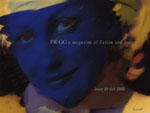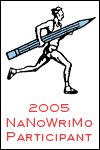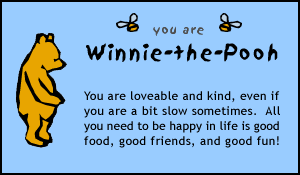Passing along a press release for a friend. While I won't reveal the identities of any of the editors involved with this, I will attest that they're terrific writers and bring solid experience to the project.
Innovative Lit Zine Launches on October 15TQR Makes the Editorial Process Visible
to Readers and SubmittersAlbuquerque, New Mexico (October 5, 2005) — The pilot issue of TQR, an online literary magazine whose motto is Stories Are Our Business™, will go online October 15. TQR will be different from other online literary magazines and aims to embrace the strengths of the Internet—its transparency, fluidity, immediacy and intimacy—and use them to create an entirely new e-zine experience.
“Unlike most other online magazines, TQR is not a print-magazine wannabe. We are an online magazine that will take advantage of the unique features of the Internet in a way that has never been seen before,” said TQR Chairman Theodore Q. Rorschalk (a pseudonym for an experienced fiction writer and editor whose writing has appeared in well-known literary magazines online).
Behind the TQR Motto: Stories Are Our Business™TQR borrows its structure and jargon from the world of big business. There are several reasons for this approach, according to Mr. Rorschalk. First, TQR believes that stories should be viewed as being real, essential capital that stands the test of time; thus editors are called "capital managers" and readers are called "investors" because by reading TQR they are investing their valuable time. Second, TQR’s persona-based, meta-drama aspect mirrors the corporate environment with its soap opera of dirty tricks, backstabbing, and power plays. Lastly, the business model allows TQR to jettison the tiresome, indistinct notion of “art for art’s sake,” and show story vetting as a specific, repeatable, step-by-step process that invites debate among staff on what elements make a good story.
TQR’s Unique Editorial ProcessAt the start of each quarter, all submitted stories begin on the Floor where the first team of editors, called “capital managers,” either reject the stories (known at TQR as “capital”) or pass them along to the next level, the Terminal.
At the Terminal level, the “capital managers” may mention the specific titles of the works being judged in editorial meetings in the Conference Room, or discussions in the Terminal’s Free Market office. All discussions will remain positive, concentrating on stories’ “capital successes” instead of their failures. A rejection gmail from The Terminal will tell the writer what it was about that particular piece that kept it from being passed on to the next level.
The works that survive the Terminal will go on to one of two TQR departments, depending on whether the Terminal deems the story to be “genre” or “spec lit fic.” The former group will go on to The Quarterly Report; the latter to The Quarterly Revolution. The respective department heads (Tessa Quinlan-Renaud and T. Quincy Rockefeller—again, pseudonyms for two highly skilled fiction writers) will then winnow their “capital” down to two or, at most, three pieces. The rejected works will get a personal gmail from Tessa or T. giving the reasons the piece didn’t make the final cut.
The last stage takes place in the Conference Room where the capital-cognizant Theodore Q. Rorschalk hosts T. and Tessa for a no-holds-barred, real-time confab (open to the public, of course), wherein each department head makes his or her case for the works that he or she has chosen. At this point, not only will the works’ titles be cited, but the authors’ names will be used as well, owing to the fact that who wrote a piece might be just as much of a “selling point” as the piece itself.
TQR, where Stories Are Our Business™, is a quarterly online literary magazine at
www.tqrstories.com. TQR features fiction in any genre from 4,000 to 12,000 words in length. TQR publishes three works per quarter and pays $50 per published piece. Submitters are warned that their stories may be discussed in detail, during a process that is visible to the reading public, at the later stages of the editorial process. Go to
www.tqrstories.com for detailed information about submitting stories and TQR’s unique evaluation process.
 Hey, gang. Just gonna put a li'l bug in your ear about another book available for pre-order. You Will Behave by Matt Getty will start shipping November 11. I've read it and will review it a little more fully when I get a chance. For now, I'll just drop a brief bit of my own experience with the book on ya:
Hey, gang. Just gonna put a li'l bug in your ear about another book available for pre-order. You Will Behave by Matt Getty will start shipping November 11. I've read it and will review it a little more fully when I get a chance. For now, I'll just drop a brief bit of my own experience with the book on ya:


 If I am a writer at all, I am a writer of flash. And not just flash as often defined by a thousand word count. Shorter. Much shorter. When I looked for stuff to submit to that contest a month ago, the only pieces I had of which I was somewhat proud were under four hundred words. One of them was barely over 200. And I'm going to attempt to write 50,000 words in a month? Insane. So I'm breaking it down and trying to think how I can make this work.
If I am a writer at all, I am a writer of flash. And not just flash as often defined by a thousand word count. Shorter. Much shorter. When I looked for stuff to submit to that contest a month ago, the only pieces I had of which I was somewhat proud were under four hundred words. One of them was barely over 200. And I'm going to attempt to write 50,000 words in a month? Insane. So I'm breaking it down and trying to think how I can make this work. Because it just came on my
Because it just came on my 






